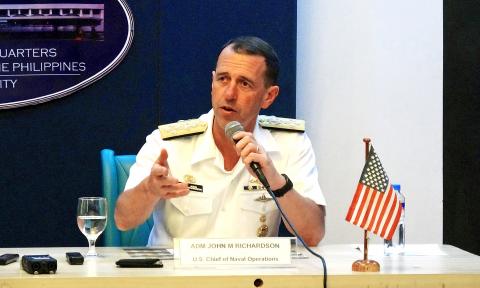The US military will continue to advocate free navigation through international waters, including the Taiwan Strait, a top US Navy official said on Monday.
“Parts of the Taiwan Strait are international waters. They are accessible to all who want to pass through them,” US Chief of Naval Operations Admiral John Richardson said at a press conference at Camp Aguinaldo, Quezon City, Philippines.
“They’re part of the global commons, which is the foundation for free navigation, and so in this area, the United States and the United States Navy will continue to advocate for free navigation through those international waters, where we will operate and sail and fly or enter wherever international law allows,” Richardson said.

Photo: CNA
The US official’s comments were made in response to a question from Central News Agency on how he sees the current situation in the Taiwan Strait, and what the US military would do to help maintain peace and stability there.
He was non-committal on what operations the US might have planned in the region for the future.
“I think it’s not healthy to speculate on those sorts of things, but you can count on us to be persistent and consistent advocates for freedom of navigation through international waters,” Richardson said.
His pledge came after two US ships, shadowed by Chinese People’s Liberation Army (PLA) warships, sailed through the Taiwan Strait on Monday last week and a Chinese destroyer came dangerously close to a US Navy ship in the disputed South China Sea last month.
The ships’ passage were criticized by China, although its response was relatively muted.
Richardson said the US Navy would continue to communicate with the PLA on the Code for Unplanned Encounters at Sea.
Noting that the Philippines and other ASEAN claimant states are negotiating a code of conduct to govern actions in the disputed area, Richardson said any progress is a move in the right direction, whether the code is legally binding or not.
In related news, President Tsai Ing-wen (蔡英文) yesterday received a delegation from Chinese-American community organization Hop Sing Tong in Taipei.
A stable Taiwan-US relationship is an important foundation for defending democracy, and maintaining peace and stability in the Indo-Pacific region, Tsai told the delegation.
Tsai thanked the overseas Taiwanese community for their warm welcome when she transited through the US on her trip to Paraguay and Belize in August, for being the government’s “backbone” overseas and for consistently supporting the nation through action.
Over the past two years, exchanges between Taiwan and the US have become more frequent and bilateral relations have continued to grow, she said.
CPC Corp, Taiwan (CPC, 台灣中油) is to purchase US$25 billion worth of liquefied natural gas from the US, and Formosa Petrochemical Corp (台塑石化) and Hon Hai Group (鴻海集團) have made investments in Louisiana and Wisconsin respectively, she said.
These partnerships help boost Taiwan-US relations, she said.
Taiwan is not only strengthening its cooperation with countries with similar ideologies, but also striving to transform and upgrade domestic industries, and to attract foreign investment, Tsai said.
Additional reporting by Sherry Hsiao

NATIONAL SECURITY THREAT: An official said that Guan Guan’s comments had gone beyond the threshold of free speech, as she advocated for the destruction of the ROC China-born media influencer Guan Guan’s (關關) residency permit has been revoked for repeatedly posting pro-China content that threatens national security, the National Immigration Agency said yesterday. Guan Guan has said many controversial things in her videos posted to Douyin (抖音), including “the red flag will soon be painted all over Taiwan” and “Taiwan is an inseparable part of China,” while expressing hope for expedited “reunification.” The agency received multiple reports alleging that Guan Guan had advocated for armed reunification last year. After investigating, the agency last month issued a notice requiring her to appear and account for her actions. Guan Guan appeared as required,

DAREDEVIL: Honnold said it had always been a dream of his to climb Taipei 101, while a Netflix producer said the skyscraper was ‘a real icon of this country’ US climber Alex Honnold yesterday took on Taiwan’s tallest building, becoming the first person to scale Taipei 101 without a rope, harness or safety net. Hundreds of spectators gathered at the base of the 101-story skyscraper to watch Honnold, 40, embark on his daredevil feat, which was also broadcast live on Netflix. Dressed in a red T-shirt and yellow custom-made climbing shoes, Honnold swiftly moved up the southeast face of the glass and steel building. At one point, he stepped onto a platform midway up to wave down at fans and onlookers who were taking photos. People watching from inside

A Vietnamese migrant worker yesterday won NT$12 million (US$379,627) on a Lunar New Year scratch card in Kaohsiung as part of Taiwan Lottery Co’s (台灣彩券) “NT$12 Million Grand Fortune” (1200萬大吉利) game. The man was the first top-prize winner of the new game launched on Jan. 6 to mark the Lunar New Year. Three Vietnamese migrant workers visited a Taiwan Lottery shop on Xinyue Street in Kaohsiung’s Gangshan District (崗山), a store representative said. The player bought multiple tickets and, after winning nothing, held the final lottery ticket in one hand and rubbed the store’s statue of the Maitreya Buddha’s belly with the other,

‘NATO-PLUS’: ‘Our strategic partners in the Indo-Pacific are facing increasing aggression by the Chinese Communist Party,’ US Representative Rob Wittman said The US House of Representatives on Monday released its version of the Consolidated Appropriations Act, which includes US$1.15 billion to support security cooperation with Taiwan. The omnibus act, covering US$1.2 trillion of spending, allocates US$1 billion for the Taiwan Security Cooperation Initiative, as well as US$150 million for the replacement of defense articles and reimbursement of defense services provided to Taiwan. The fund allocations were based on the US National Defense Authorization Act for fiscal 2026 that was passed by the US Congress last month and authorized up to US$1 billion to the US Defense Security Cooperation Agency in support of the